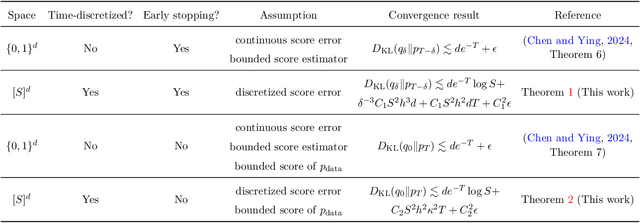Convergence of Score-Based Discrete Diffusion Models: A Discrete-Time Analysis
Paper and Code
Oct 03, 2024

Diffusion models have achieved great success in generating high-dimensional samples across various applications. While the theoretical guarantees for continuous-state diffusion models have been extensively studied, the convergence analysis of the discrete-state counterparts remains under-explored. In this paper, we study the theoretical aspects of score-based discrete diffusion models under the Continuous Time Markov Chain (CTMC) framework. We introduce a discrete-time sampling algorithm in the general state space $[S]^d$ that utilizes score estimators at predefined time points. We derive convergence bounds for the Kullback-Leibler (KL) divergence and total variation (TV) distance between the generated sample distribution and the data distribution, considering both scenarios with and without early stopping under specific assumptions. Notably, our KL divergence bounds are nearly linear in dimension $d$, aligning with state-of-the-art results for diffusion models. Our convergence analysis employs a Girsanov-based method and establishes key properties of the discrete score function, which are essential for characterizing the discrete-time sampling process.
 Add to Chrome
Add to Chrome Add to Firefox
Add to Firefox Add to Edge
Add to Edge